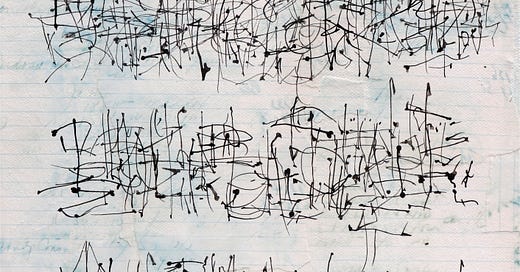For an Artist, a Good Question Is Hard to Come By
Journal Entry: Monday, December 9, 2024
For an Artist, a Good Question Is Hard to Come By
Answers are everywhere but without a question why would we bother to look for them? We live in an age where every question seems to have been asked, explored, and answered by someone, somewhere. From tutorials on YouTube to libraries of meticulously cataloged knowledge, information is abundant. Yet, for an artist, this abundance can feel hollow because we ourselves have not gone out and plodded around for it. It’s not the answers that matter—it’s the questions. And finding a good question, one worth wrestling with, is far rarer and far more valuable.
The Tyranny of Answers
Answers provide comfort and resolution, but they can also be limiting. When you’re handed an answer, the exploration ends. It’s neat, tidy, and often uninspiring and might not be an answer that you would have come up with had you thought to look for it yourself.
For artists, creativity thrives in uncertainty and exploration. Art is not about reaching conclusions; it’s about navigating the liminal in-between spaces, probing the unknown, and expressing what cannot be easily resolved. The pursuit of a good question sparks curiosity and invites a journey—something no pre-packaged answer can ever truly provide.
What Makes a Question Good?
A good question doesn’t just seek information; it challenges, provokes, and opens up new possibilities. It should:
Be Open-Ended: A good question invites exploration, not a definitive response. For example, instead of asking, “How do I paint a sunset?” you might ask, “What does this sunset make me feel, and how can I express that?”
Reflect Personal Inquiry: The best questions come from within, rooted in your unique perspective and experiences. These are the questions that resonate deeply and demand your creative attention.
Lead to Discovery: A good insightful question pulls you into new territories of thought or technique, often leading to surprising outcomes.
Challenge Assumptions: It forces you to reconsider what you know, encouraging growth and deeper understanding.
Finding Your Questions
For artists, the search for good questions begins with self-awareness. Answers may be everywhere, but the right questions come from within.
Pay Attention to Curiosity: What fascinates you? What themes or ideas do you keep returning to? Let these be the seeds of your inquiry.
Engage with the World: Look beyond yourself. Questions often arise from observing people, nature, or culture. A chance encounter, a fleeting moment, or a seemingly mundane detail can spark a profound question.
Sit with Uncertainty: Resist the urge to rush to conclusions. Allow yourself to linger in the unknown, where questions have room to grow through contemplative ponderings.
Questions as Creative Catalysts
Great art often begins with a question. Picasso’s work might be seen as a response to the question, “What if I reject traditional perspective?” Jackson Pollock’s drips could be his exploration of, “What happens when I let go of control?” Georgia O’Keeffe’s flowers may ask, “How can I make people see beauty they overlook?”
These aren’t questions with easy answers—they are lived inquiries. The artist’s journey is not about finding a single solution but about continuously engaging with the evolving question.
Living the Questions
Rainer Maria Rilke’s famous advice to a young poet captures this beautifully:
“Be patient toward all that is unsolved in your heart and try to love the questions themselves, like locked rooms and like books that are now written in a very foreign tongue.”
As an artist, living your questions means allowing them to guide your work, your growth, and your practice. It means resisting the temptation to resolve them too quickly and embracing the process of exploration.
The Value of Hard Questions
Good questions are rare because they demand vulnerability. They challenge you to confront the limits of your knowledge, skill, and imagination. But these hard questions are also the source of your best work. They force you to dig deeper, to take risks, and to discover something new—not just about your art, but about yourself.
Conclusion
Answers are abundant, but questions are treasures. For an artist, the right question can be a compass, a muse, and a creative spark all in one. So don’t rush to fill every gap with an answer. Instead, ask better, harder, more personal questions. Then live with them, wrestle with them, and let them lead you to art that matters.






My questions about a piece are deeply quiet and almost subconscious but I am asking 'what do I want to say here? or what am I trying to convey in this piece?' That's for my own knowledge yet the work is open to interpretation to the viewer as there really isn't any one right answer. Meanwhile as I work on a piece (and even before I start) I have to ask myself the 'hows' of a piece, that is the engineering of putting the pieces together so the finished piece will not only be cohesive, but that the "seams" are invisible...so to speak....and I know the piece will not fall apart upon being moved around. Great article as always and food for thought.
Cecil, I applaud your focus on the importance of "questions." I am reminded of something that Picasso was reported to have said. I'm paraphrasing, "What good are computers? They only give you answers."